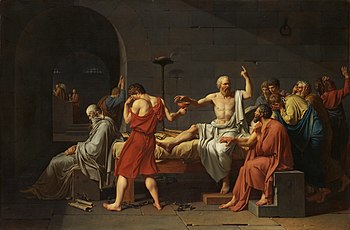
Socrates was at the start of a revolution in the perception of death. It had been experienced as a return to the ancestors. It became the way to discover the life beyond this life. This is an edited extract from my book, A Secret History of Christianity: Jesus, the Last Inkling and the Evolution of Consciousness.
Our distant ancestors appear not to have felt that the difference between life and death was absolute. The dead lived with their ancestors and living people believed they would join them when they died. However, they had this sense because they did not feel themselves to be isolated individuals. Their life was always already intimately tied up with the life of others. Death was a transition, therefore, rather than an end, because at death someone was felt to be returning to the life of their kin or tribe with which they had, all along, been sharing.
This had begun to change with the emergence of a more individualized consciousness. As a sense of gathered, personal awareness formed, so could a perception of psychic boundaries. There a difference between what’s me and not me, what’s mortal and immortal, what’s inner and outer. That becomes clearer. However, there’s a price for such individuality. At death, it could seem that life would be lost because the innate sense of connection with the flow of life had been broken, or at least eclipsed.
It’s why preparations for postmortem existence shifted. Socrates argued that the connection between life and death, without a loss of the gains of individuality, could be found once more if the individual could readjust their sight to appreciate eternal life in this life. In the Phaedo dialogue, for example, Plato portrays Socrates as ready for death because he has one eye settled on the side of life that doesn’t die, which he has befriended in the here and now. “Those who philosophize rightly make dying their care,” Socrates remarks. It’s another aspect of philosophy as a way of life. The philosopher steps back from the commonplace fears of frightened mortals and awakens to a forgotten ground. They’re facing death to discover life.
The realization is that readying oneself for the life beyond this life requires a practice constantly of letting go of the sense that you possess your own life. It’s not yours to have but it is yours to cultivate.
Plato summed it up with the expression that to philosophize is to learn how to die. He saw that death had come to be greatly feared by his fellows because of the tendency to cling to life as if an inalienable right. But that fear was also a clue. Instead of fighting death, the philosopher might use the ups and downs of every day to become conversant with the edges of life. The relationship between sunrises and sunsets, what’s understood and what’s not understood, what works and what fails, what’s temporal and eternal, can be consciously investigated. It is in the midst of life that we realize we participate in far more than just our own life. So, by understanding your humanity, you might understand how you share in what’s good, beautiful and true, insofar as they manifest in your humanity. The philosopher awakens as they gain a capacity to attune to life, which brings in its wake a gradual attunement to the divine. As Plato explained in the Timeaus, it is through contact with mortal life that the soul recalls its immortal life because it learns that what’s created and mortal is shaped by what’s eternal and immortal.
But there’s a paradox. This very conformation feels like dying because, in a sense, it is. It is dying to the narrow view that, unchecked, the individual spontaneously and tenaciously adheres to. We are inclined to imprison ourselves in a carapace of mortal fears and possessive desires.
The philosopher, A.N. Whitehead, noted that such “scenes of solitariness” haunt the religious imagination. It’s the central moment in any spiritual journey of weight and has subsequently been given many names from the dark night of the soul to having a breakdown. “It belongs to the depth of the religious spirit to have felt forsaken, even by God,” Whitehead said. But it is the forsakenness that opens up the depths.
In time, Platonists like Iamblichus were to agree. He affirmed explicitly that immortality is not gained by trying to escape mortal life but by conforming fully to mortal life, which in death can be recognized as replete with the timeless. The psychotherapist, Marion Milner, discovered a similar meaning to the crucifixion. She called it the “dramatization of an inner process of immense importance to humanity, a process which was not an escape from reality, but the only condition under which the inner reality could be perceived.”
The realization has been reiterated by multiple voices. By embracing human life, to the point of dying, we came to what is deathless in life. Meister Eckhart captures it joltingly: “The kingdom of heaven is only for the perfectly dead.”
To read more: A Secret History of Christianity: Jesus, the Last Inkling and the Evolution of Consciousness